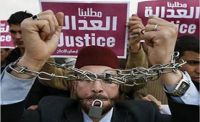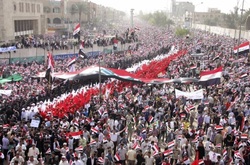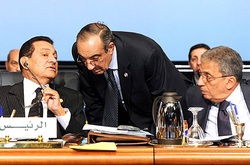MB Submits Memo to SCAF to Drop the Military Charges against 114 of Its Leaders

The Muslim Brotherhood (MB) submitted an official memo to the Supreme Council of Armed Forces (SCAF) calling it to drop all the charges and sentences against 114 of its leaders in six military cases that took place during Mubarak’s era.
The six cases are: the MB Shura Council case in 1995, Al-Wasat party case, the Salsabil case in 1999, the Trade Union case in 2001 and Al-Azhar militia case in 2007.
The memorandum highlighted the names of those who were tried in military courts such as Mohamed Mahdi Akef, former MB chairman, Dr. Mahmoud Ezzat, deputy chairman, Khairat Alshater, MB leader and Dr. Mahmoud Hussein, secretary general of the MB.
The six cases are: the MB Shura Council case in 1995, Al-Wasat party case, the Salsabil case in 1999, the Trade Union case in 2001 and Al-Azhar militia case in 2007.
The memorandum highlighted the names of those who were tried in military courts such as Mohamed Mahdi Akef, former MB chairman, Dr. Mahmoud Ezzat, deputy chairman, Khairat Alshater, MB leader and Dr. Mahmoud Hussein, secretary general of the MB.
Western leaders insist 'Gaddafi must go'

15th April, 2011
Leaders of Britain, France and the United States have vowed to continue their military campaign in Libya until Muammar Gaddafi leaves power.
In a strongly worded, jointly written article published in newspapers on both sides of the Atlantic, British prime minister David Cameron, French president Nicolas Sarkozy and US president Barack Obama said leaving Gaddafi in power would be an "unconscionable betrayal" of the Libyan people.
"It is unthinkable that someone who has tried to massacre his own people can play a part in their future government," the leaders wrote in an opinion piece released on Thursday.
"So long as Gaddafi is in power, NATO and its coalition partners must maintain their operations so that civilians remain protected and the pressure on the regime builds," they said.
Keep up with all the latest developments here"Then a genuine transition from dictatorship to an inclusive constitutional process can really begin, led by a new generation of leaders. For that transition to succeed, Colonel Gaddafi must go, and go for good."
The reaction from the Gaddafi camp was swift as the Libyan leader's daughter Aisha told a rally in Tripoli, at a family compound bombed by the Americans in 1986, that demanding her father's departure was an insult to the Libyan people.
"Talk about Gaddafi stepping down is an insult to all Libyans because Gaddafi is not in Libya, but in the hearts of all Libyans," she said in a speech on Thursday broadcast live on Libyan television to mark the 25th anniversary of American strikes on the huge complex, which includes military barracks.
State television also showed footage of a defiant Gaddafi cruising through the streets in a green safari jacket and sunglasses, pumping his fists and waving from an open-top vehicle.
Meanwhile, NATO has launched three new airstrikes in and around the Libyan capital, striking a missile battery and two other targets.
France and Britain want to extend air strikes to the logistics and decision centres of Gaddafi's army, rather than start arming Libyan rebels, Gerard Longuet, the French defence minister, said on Friday.
Asked if it was time to send weapons to the rebels, Longuet said: "This is the reason France and Britain want to show our determination, including with strikes on military decision centres in Libya or on logistics depots which today are being spared.
"Why? Because if we want to avoid civil war... the force of the other side must be neutralised, and so the strikes we are asking for are aimed at not having to arm the insurgents. Our goal is not to organise a front, it's that Gaddafi's troops go back to their barracks," he told LCI television
Leaders of Britain, France and the United States have vowed to continue their military campaign in Libya until Muammar Gaddafi leaves power.
In a strongly worded, jointly written article published in newspapers on both sides of the Atlantic, British prime minister David Cameron, French president Nicolas Sarkozy and US president Barack Obama said leaving Gaddafi in power would be an "unconscionable betrayal" of the Libyan people.
"It is unthinkable that someone who has tried to massacre his own people can play a part in their future government," the leaders wrote in an opinion piece released on Thursday.
"So long as Gaddafi is in power, NATO and its coalition partners must maintain their operations so that civilians remain protected and the pressure on the regime builds," they said.
Keep up with all the latest developments here"Then a genuine transition from dictatorship to an inclusive constitutional process can really begin, led by a new generation of leaders. For that transition to succeed, Colonel Gaddafi must go, and go for good."
The reaction from the Gaddafi camp was swift as the Libyan leader's daughter Aisha told a rally in Tripoli, at a family compound bombed by the Americans in 1986, that demanding her father's departure was an insult to the Libyan people.
"Talk about Gaddafi stepping down is an insult to all Libyans because Gaddafi is not in Libya, but in the hearts of all Libyans," she said in a speech on Thursday broadcast live on Libyan television to mark the 25th anniversary of American strikes on the huge complex, which includes military barracks.
State television also showed footage of a defiant Gaddafi cruising through the streets in a green safari jacket and sunglasses, pumping his fists and waving from an open-top vehicle.
Meanwhile, NATO has launched three new airstrikes in and around the Libyan capital, striking a missile battery and two other targets.
France and Britain want to extend air strikes to the logistics and decision centres of Gaddafi's army, rather than start arming Libyan rebels, Gerard Longuet, the French defence minister, said on Friday.
Asked if it was time to send weapons to the rebels, Longuet said: "This is the reason France and Britain want to show our determination, including with strikes on military decision centres in Libya or on logistics depots which today are being spared.
"Why? Because if we want to avoid civil war... the force of the other side must be neutralised, and so the strikes we are asking for are aimed at not having to arm the insurgents. Our goal is not to organise a front, it's that Gaddafi's troops go back to their barracks," he told LCI television
Arab leaders warned of 'revolution'

The head of the Arab League has told the region's leaders that the recent upheaval in Tunisia is linked to deteriorating economic conditions throughout the Arab world, warning them that their people's anger has reached unprecedented heights.
Amr Moussa told an Arab economic summit in Egypt that "the Arab soul is broken by poverty, unemployment and general recession."
"This is in the mind of all of us," Moussa said in his opening address to the 20 Arab leaders and other representatives of Arab League members gathered in the Red Sea resort of Sharm el-Sheikh.
The summit is the first top level Arab meeting since protests fuelled by joblessness and other economic woes in Tunisia forced Zine El Abidine Ben Ali, the president, to flee, bringing an end to his 23-year rule of the country.
The unrest has helped inspire similar protests around the Arab world and calls for political change, although activists in many countries face security forces heavily vested in maintaining the status quo and governments that refuse to allow dissent.
"The Tunisian revolution is not far from us," Moussa warned. "The Arab citizen entered an unprecedented state of anger and frustration."
He called for an Arab "renaissance" to lift people from their frustration.
Amr Moussa told an Arab economic summit in Egypt that "the Arab soul is broken by poverty, unemployment and general recession."
"This is in the mind of all of us," Moussa said in his opening address to the 20 Arab leaders and other representatives of Arab League members gathered in the Red Sea resort of Sharm el-Sheikh.
The summit is the first top level Arab meeting since protests fuelled by joblessness and other economic woes in Tunisia forced Zine El Abidine Ben Ali, the president, to flee, bringing an end to his 23-year rule of the country.
The unrest has helped inspire similar protests around the Arab world and calls for political change, although activists in many countries face security forces heavily vested in maintaining the status quo and governments that refuse to allow dissent.
"The Tunisian revolution is not far from us," Moussa warned. "The Arab citizen entered an unprecedented state of anger and frustration."
He called for an Arab "renaissance" to lift people from their frustration.

